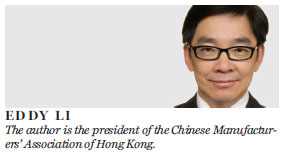Growing service sector will boost mainland economy
Updated: 2015-03-31 08:07
By Eddy Li(HK Edition)
|
|||||||
During the annual sessions of China's top legislative and political advisory body, the central government announced a target of a 7 percent growth in gross domestic product (GDP).
This figure seems relatively low compared to previous years. However, taken in the wider context of GDP growth projections for other major world economies; 2.8 percent for the US, 2 percent for Japan and 1.5 percent for the Eurozone, China's projections stand out as ambitious growth targets.
After all, the mainland has long enjoyed strong GDP growth. But the economy has developed at a rapid yet stable pace. This is something which is undoubtedly the envy of other countries.
Given the unfavorable domestic and international economic conditions, the goal of maintaining 7 percent growth will be a difficult challenge. The General Administration of Customs of China earlier revealed that in 2014, the gross value of imports and exports in foreign trade amounted to $4.3 trillion - a minimal increase of 3.4 percent. This is the third consecutive year that the gross value of imports and exports has failed to meet its target, and growth in this sector was obviously far lower than overall economic growth.
Negative growth of 10 percent was even reported in January. Judging from this data, foreign trade can obviously no longer support the country's economic growth as it did. It has lost its position as the main economic engine. This will make achieving this year's GDP target even more difficult.
In the Report on the Work of the Government 2015 delivered by Premier Li Keqiang, less than 150 words were devoted to discussions on overseas capital (including that from Hong Kong) investment. The evident reduction shows China is reducing its dependence on overseas capital. Instead, the central government has wisely decided to stimulate its economy by fueling domestic demand.
In the report, while emphasizing the need to implement strict controls over official receptions, vehicles and overseas trips, the central government encourages public consumption. This includes promoting elderly care, domestic and healthcare services, and increasing spending on information goods and services. It is also increasing consumer spending on leisure and tourism, encouraging green consumption and ensuring housing consumption remains stable. The authorities are also encouraging people to spend more on education, cultural pursuits and sports.
The government has also proposed accelerating the development of fiber-optic networks and significantly increasing broadband speeds, developing logistics and express delivery services. It is aiming to ensure that new forms of Internet-based spending, which combine online-offline activities, will continue to thrive.
The size of the service industry in the mainland economy can also not be ignored. Last year, tertiary industries accounted for 48.2 percent of the country's overall GDP, higher than the 46.9 percent of 2013. As the premier noted, this promising sector is becoming a dominant industry in the economy and providing many job opportunities. When supportive polices on taxes, land use, and pricing are implemented, the future of service industries will be even brighter.
Central government efforts to promote public consumption and service industries will also provide huge opportunities for Hong Kong. The city's high-quality products are respected and appreciated by mainland customers. Moreover, Hong Kong also provides a range of world-class services. In both areas, Hong Kong is highly competitive. The SAR government should encourage officials in related departments to discuss these issues with experts and the business elite. This is to find ways to boost logistics, network support, and trading platforms in Hong Kong.

(HK Edition 03/31/2015 page10)